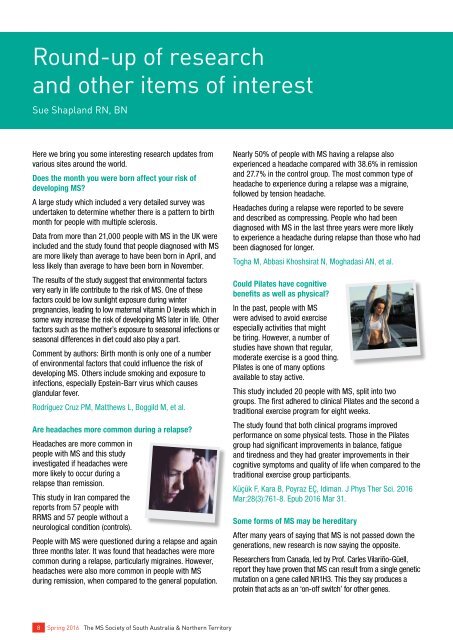Create successful ePaper yourself
Turn your PDF publications into a flip-book with our unique Google optimized e-Paper software.
Round-up of research<br />
and other items of interest<br />
Sue Shapland RN, BN<br />
Here we bring you some interesting research updates from<br />
various sites around the world.<br />
Does the month you were born affect your risk of<br />
developing MS?<br />
A large study which included a very detailed survey was<br />
undertaken to determine whether there is a pattern to birth<br />
month for people with multiple sclerosis.<br />
Data from more than 21,000 people with MS in the UK were<br />
included and the study found that people diagnosed with MS<br />
are more likely than average to have been born in April, and<br />
less likely than average to have been born in November.<br />
The results of the study suggest that environmental factors<br />
very early in life contribute to the risk of MS. One of these<br />
factors could be low sunlight exposure during winter<br />
pregnancies, leading to low maternal vitamin D levels which in<br />
some way increase the risk of developing MS later in life. Other<br />
factors such as the mother’s exposure to seasonal infections or<br />
seasonal differences in diet could also play a part.<br />
Comment by authors: Birth month is only one of a number<br />
of environmental factors that could influence the risk of<br />
developing MS. Others include smoking and exposure to<br />
infections, especially Epstein-Barr virus which causes<br />
glandular fever.<br />
Rodríguez Cruz PM, Matthews L, Boggild M, et al.<br />
Are headaches more common during a relapse?<br />
Headaches are more common in<br />
people with MS and this study<br />
investigated if headaches were<br />
more likely to occur during a<br />
relapse than remission.<br />
This study in Iran compared the<br />
reports from 57 people with<br />
RRMS and 57 people without a<br />
neurological condition (controls).<br />
People with MS were questioned during a relapse and again<br />
three months later. It was found that headaches were more<br />
common during a relapse, particularly migraines. However,<br />
headaches were also more common in people with MS<br />
during remission, when compared to the general population.<br />
Nearly 50% of people with MS having a relapse also<br />
experienced a headache compared with 38.6% in remission<br />
and 27.7% in the control group. The most common type of<br />
headache to experience during a relapse was a migraine,<br />
followed by tension headache.<br />
Headaches during a relapse were reported to be severe<br />
and described as compressing. People who had been<br />
diagnosed with MS in the last three years were more likely<br />
to experience a headache during relapse than those who had<br />
been diagnosed for longer.<br />
Togha M, Abbasi Khoshsirat N, Moghadasi AN, et al.<br />
Could Pilates have cognitive<br />
benefits as well as physical?<br />
In the past, people with MS<br />
were advised to avoid exercise<br />
especially activities that might<br />
be tiring. However, a number of<br />
studies have shown that regular,<br />
moderate exercise is a good thing.<br />
Pilates is one of many options<br />
available to stay active.<br />
This study included 20 people with MS, split into two<br />
groups. The first adhered to clinical Pilates and the second a<br />
traditional exercise program for eight weeks.<br />
The study found that both clinical programs improved<br />
performance on some physical tests. Those in the Pilates<br />
group had significant improvements in balance, fatigue<br />
and tiredness and they had greater improvements in their<br />
cognitive symptoms and quality of life when compared to the<br />
traditional exercise group participants.<br />
Küçük F, Kara B, Poyraz EÇ, Idiman. J Phys Ther Sci. 20<strong>16</strong><br />
Mar;28(3):761-8. Epub 20<strong>16</strong> Mar 31.<br />
Some forms of MS may be hereditary<br />
After many years of saying that MS is not passed down the<br />
generations, new research is now saying the opposite.<br />
Researchers from Canada, led by Prof. Carles Vilariño-Güell,<br />
report they have proven that MS can result from a single genetic<br />
mutation on a gene called NR1H3. This they say produces a<br />
protein that acts as an ‘on-off switch’ for other genes.<br />
Just one in 1,000 people with MS have this specific mutation<br />
according to the researchers. However, the finding uncovers the<br />
biological pathway that leads to the rapidly progressive form of<br />
MS, which accounts for 15% of people with the disease.<br />
The researchers used blood samples from 4,400 people<br />
with MS and 8,600 blood relatives as part of a 20-year<br />
project funded by the MS Society of Canada and the Multiple<br />
Sclerosis Scientific Research Foundation.<br />
They found the mutation in two Canadian families in which<br />
several members lived with a rapidly progressive type of the<br />
disease. In these families, two-thirds of the people with the<br />
genetic mutation developed MS.<br />
Childhood obesity linked to higher risk of MS<br />
A collaboration between researchers from Canada and the<br />
UK has found a causal relationship between obesity and the<br />
risk of developing multiple sclerosis. Several observational<br />
studies suggest that obesity (measured by Body Mass Index<br />
or BMI) in a person’s earlier stages of life is associated<br />
with an increased risk of developing MS. The research also<br />
suggested a relationship between the decrease in vitamin<br />
D levels as a person’s weight increases as a possible<br />
mechanism for the increased risk.<br />
The Progressive MS Alliance Updates<br />
More than 2.3 million people live with MS worldwide; over<br />
one million have progressive MS. Up to 15% are diagnosed<br />
with primary progressive MS. Whilst there have been<br />
advances in understanding other forms of MS, progressive<br />
MS remains difficult to understand and treat.<br />
The International Alliance was set up to focus research<br />
efforts on progressive MS; Australia is represented<br />
through MSRA. Initial funding was allocated for 22 projects<br />
designed to improve understanding of genetic and biological<br />
processes, repurpose existing drugs and speed up clinical<br />
trials. These one to two year research projects began in<br />
2015, and focus on six areas:<br />
• Clinical trials and outcome measures<br />
• Biomarkers of progression<br />
• Gene studies<br />
• Rehabilitation trials<br />
• Underlying pathology of progression<br />
• Developing new disease models<br />
Cancer risk associated with Mitoxantrone<br />
Mitoxantrone is an anti-cancer drug that was sometimes<br />
used to treat active MS. Dosage was limited as it is known<br />
to cause damage to the heart muscles. It is already known<br />
that there is an associated increased risk of cancer. This<br />
study followed a group of German patients for a number<br />
of years. They reported that 5% of people or 1 in 20 got<br />
cancer. Whilst life is associated with a cancer risk, this<br />
appears high and is one of the reasons that use of this agent<br />
has dwindled.<br />
Conclusion: While the overall incidence of malignancies<br />
was only mildly increased, the risk of leukaemia and<br />
colorectal cancer was heightened. If confirmed, post-therapy<br />
colonoscopy could become advisable.<br />
Buttmann M, Seuffert L, Mäder U, Toyka KV. Malignancies<br />
after mitoxantrone for multiple sclerosis: A retrospective<br />
cohort study. Neurology. 20<strong>16</strong> Jun 7;86(23):2203-7.<br />
Websites of interest:<br />
MS in children online resources from MSIF<br />
Here you can find information about MS in children and<br />
download a parent’s guide.<br />
Visit: msif.org/about-ms/childhood-ms/<br />
MStranslate<br />
This Australian website seeks to bring together “the wealth<br />
of information on MS in a way that makes it accessible to<br />
every element of the community”.<br />
There are a range of links and summaries of various<br />
research studies including those looking into lifestyle<br />
modification e.g. the multiple benefits of exercise.<br />
They collaborate with a range of Australian researchers<br />
including Professor George Jelinek, head of the<br />
Neuroepidemiology Unit at the University of Melbourne.<br />
Visit: mstranslate.com.au<br />
Read more at:<br />
ms.asn.au/researchupdate<br />
8 <strong>Spring</strong> 20<strong>16</strong> The MS Society of South Australia & Northern Territory The MS Society of South Australia & Northern Territory <strong>Spring</strong> 20<strong>16</strong> 9


















